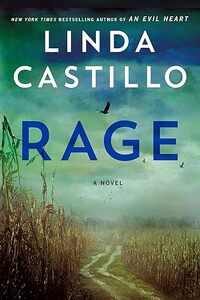 RAGE |
 Fall headfirst into July’s hottest stories—danger, desire, and happily-ever-afters await. |

Purchase
Going Back Romance Series Excerpt of Everything To Prove by Nadia NicholsIT WAS THE ARTICLE in Forbes magazine that gave Libby Wilson the sudden impetus to throw all caution to the wind and do what she'd been waiting to do for the past twelve years. She read that article and realized that she had to go back home and make things right. Not five years from now as originally planned, when her bank account would be healthy enough to finance what was certain to be an expensive undertaking. She had to go now. The truth had remained buried for far too long. She knew her mother would object, but her mother could no longer tell her that the past didn't matter, because it did. Libby knew exactly how much it mattered. She'd grown up in the same village that her mother had. She'd lived in the same little government-issue house, been shipped out to the same boarding school in Anchorage to attend high school; she'd worn the same clothes, eaten the same foods and felt the same bleak desolation when one of the village kids sniffed too much gasoline and was buried beneath the permafrost. The only difference between the poverty her mother suffered and her own fate had been the color of Libby's eyes. The teacher in Anchorage had commented about her eyes. Ms. DeFranco had been young and earnest and from a well-to-do family in New England that believed in helping less fortunate cultures. She had made Libby's future her personal crusade, which was the only reason Libby ended up going to college back East, being accepted to Tufts medical school and graduating top of her class. Proof positive that sometimes a little bit of racism could work to a minority's benefit. Her internship was in forensic pathology and her ticket to success had been a reasonably sharp intellect and a pair of the prettiest blue eyes that ever came out of an Athapaskan villa-ger...compliments of a Russian fur trader two generations removed on her mother's side, and a father she'd never known. Libby's internship at Massachusetts General had just recently ended and two months ago she'd been offered a residency, an impressive nod to her potential from such a fine hospital. She might have accepted it and spent the next five years bolstering her bank account and carefully plotting her return to Evening Lake, but that very week Forbes magazine hit the newsstands and a copy ended up on the table in the doctors' lounge. Idly thumbing through the pages in one of those rare quiet moments that sometimes occur in the middle of an endless shift, Libby had stumbled over that fateful article with all those glossy color pictures and a lengthy feature profiling one of Alaska's wealthiest and most eccentric residents: the silver-haired and distinguished-looking Daniel Frey. Libby had taken the magazine back to her apartment and read the article again, and yet again after that, studying the pictures of the massive log lodge, the lake and the man; all the while her blood pressure nudged toward the boiling point. Daniel Frey. Even the man's name sickened her. She should write a letter to the editors of fancy Forbes magazine about the eccentric billionaire Daniel Frey and tell them the stories her mother had told her. She'd tell them what it had been like to work for the rich white man who hated Indians. What it had been like to be treated with contempt, to be unfairly compensated for long hours worked, to be housed in crowded conditions and poorly fed. What it had been like for her mother to fall in love with Connor Libby, Frey's godson, only to lose her beloved on her wedding day in a suspicious plane crash. A crash her mother believed Frey had rigged both to keep Connor from bringing an Athapaskan bride back to the lodge and to claim the entire Libby fortune as his own. She'd tell them what it had been like for her mother to go to Frey after learning she was pregnant with Connor's child, only to be driven from the property. "I know how you squaws sleep around," Frey had said. "That baby could be anyone's." Connor Libby had been mentioned only briefly in the article. Two sentences made reference to the fact that Ben Libby's only son had been killed in a plane crash shortly after returning from Vietnam...and that Connor's will had specified that if he died without heirs, Frey would inherit his share of the Libby fortune. What Libby had to prove was that Connor in fact had had an heir, and she was determined to do just that. She remembered vividly that fateful day in high school biology class when she'd first learned about DNA, and how it could be used to prove a person's paternity. That knowledge had changed her entire life's focus, and had even steered her medical studies toward specializing in forensic pathology. Libby had long been planning to return to Evening Lake, where her father's plane had crashed, and salvage the wreckage. The only thing that had stopped her from doing it years ago was the large amount of money it would take to find and recover the plane. She'd made inquiries to salvage operators while she was in college, but none of them could be specific as to the costs because each salvage operation was unique. All they could tell her was that it would be expensive. As a medical student, Libby had worked part-time during the school year and full-time in the summers to help cover the cost of her books and tuition. Scholarships and student loans had covered the rest, but saving any amount of money had been impossible. As an intern, she'd struggled to make ends meet and pay off her school debts. Logically, she should have accepted the residency that had been offered to her and worked until her finances improved, but none of that would matter if she could find just one of Connor Libby's bones and prove she was his daughter. The magazine article had become the catalyst, and after Libby had finished reading it for the third time, she'd made her decision. Her mother had told her over and over again, throughout years of listening to Libby rail against the injustices of poverty, that there was no way to prove anything, and it no longer mattered. But it did. It mattered twenty-eight years ago, and it mattered just as much today. And her mother was wrong. There was a way to prove not only her paternity, but what kind of racist Frey really was. Which was why she turned down the offer of a residency at one of the best hospitals on the Eastern seaboard and was now flying to Alaska. The flight was a long one and gave her time to think about her strategy. What she actually thought about was the fact that she didn't have a strategy, and had no idea how to start the search for her father's plane other than by confronting Daniel Frey in person, something she'd always wanted to do but never dared. This strategy was a poor one, given his attitude toward the native people. He'd certainly never admit to any wrongdoings, never admit that it was strange he hadn't wanted to attend his own godson's wedding, and equally strange he hadn't been anywhere in the vicinity of the lodge when the plane crashed. Her mother had mentioned a warden, Charlie Stuck, who had been kind to her after Connor's death. He'd taken her in his plane while he searched for her missing fiancé. They'd searched for over a week before declaring him lost and presumed dead. No plane wreckage was ever found, just the two pontoons hung up in the rapids about a half mile down the Evening River, which led searchers to believe that the plane had gone down in the deep waters somewhere near the lake's outlet. Charlie Stuck had been in his late fifties then, but with any luck he might still be alive. He might remember something helpful, and it was a starting place. When her flight touched down in Anchorage it was 10:00 p.m. and still broad daylight. Libby rented a car and threw her bags in the backseat. She drove down Highway One to a right-hand fork that took her along Six Mile Creek to a place called Hope. An empty state campground, open for the season but devoid of tourists, offered her the choice of sites overlooking Turnagain Arm. She pitched her tiny tent, ate a can of cold beans sitting on the edge of the bluff then walked a short way in the violet dusk down Gull Rock Trail. She walked until the twilight thickened and jelled, then carefully retraced her way back to her tent site and climbed into her sleeping bag. An hour later she heard a mysterious noise and crawled out of her tent to watch the ghostly movements of a pod of Beluga whales through the dark waters of Chickaloon Bay. Sitting with her arms wrapped around her knees, she listened to them breathe as they surfaced and swam past, and she wondered why it had taken her so long to come back home. Two hours later she was making coffee on her tiny camp stove, drinking it in the dawn while a cow moose browsed along the water's edge. She cleaned up the site, packed her gear back into the rental car and returned to Anchorage. Once there, she headed for the regional office of the Department of Fish and Game and had to wait outside for an hour before the first employee showed up, still blinking sleep from his eyes. He introduced himself as Elmer Brown, and appeared surprised to find her waiting on the doorstep. He ushered her into the office and listened to her story while he made a pot of coffee. Libby told him about the plane crash, omitting any mention of her relationship to the pilot or any implications of foul play. She expressed her interest in locating the plane and speaking to the warden who had been involved in the search. "So, you're looking for this Charlie Stuck," Brown concluded. Libby nodded. "I'm hoping he's still alive. He was in his fifties then, based out of Fairbanks." Brown reached for the phone book and placed a call to the Fairbanks office, briefly describing the circumstances and asking if they could look into their records, then hung up. "They said they'd call back. Coffee?" "Love a cup, thanks," Libby said, taking the offered mug. "Assuming the plane is still in the lake, how would one go about finding it?" "Well, it'd be easier now than it would have been back then, but still, that's a mighty big lake. Deep, too," Brown said. "There's a good salvage outfit not too far from here. They're expensive, all those outfits are, but Alaska Salvage just about always get what they go after. They've hauled a lot of planes and boats out of a lot of deep water. The company is owned by a guy named Dodge. He spent eight years as a Navy special forces combat and demolition diver before starting Alaska Salvage maybe six, eight years ago. Loads of experience, but he nearly bought the farm in a freak diving accident while salvaging that commuter plane that went down in the inlet five weeks back. You probably saw that in the news." Libby shook her head. "No. I didn't." Elmer seemed pleased to be able to enlighten her. "He had a new employee on board the salvage vessel, and the kid accidentally started the winch while Dodge was attaching the cable to a piece of wreckage a hundred feet below. He got tangled up in a big jagged piece of plane wreckage. His divers managed to free him and get him to the surface but he was more dead than alive when they brought him up. Spent over a month in the hospital getting put back together. Just got out. He'll probably never dive again but he still ramrods the outfit and he'd be the one you'd want to talk to. His office isn't far from here." "If he just got out of the hospital, I doubt he'll be at work." "He'll be at Alaska Salvage. He lives and breathes that place." Brown wrote the name and phone number on a card, handing it to her just as the phone rang. He picked it up. "Oh?" he said after a long pause. "I see. Okay, I'll pass that information along. Thanks, Dick." He hung up and gave her an apologetic shrug. "Well, I'm afraid you're out of luck when it comes to Charlie Stuck. He died last winter in the old folks' home, but he had a son, Bob, who still lives in the Fairbanks area. Runs a garage out toward Moose Creek. Might be worth talking to him." He scrawled another name on another card, then went through the phone book and wrote the phone number down. "You might also check with the warden service based out of Fairbanks. They keep pretty good files on that stuff. They probably still have Charlie Stuck's report on that particular search. Good luck." Excerpt from Everything To Prove by Nadia Nichols |
|
| |||
|
||||



 © 2003-2025
© 2003-2025